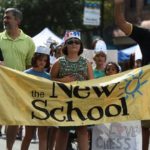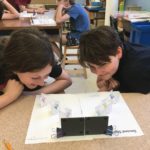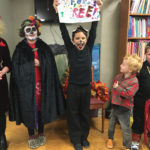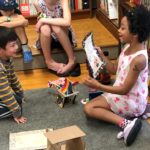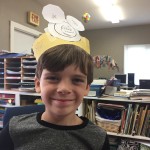As schooling became more the norm, a child’s inclusion and exposure to the wide world was more limited and controlled. However, as Neil Postman in The Disappearance of Childhood says, “The world of the known and the not yet known is bridged by wonderment….where the child’s world…must seek entry, through their questions…As media merge the Read More >>
What does it mean to individualize curriculum?
Your child is like no other. At The New School we build our relationship with your child based on the understanding that each child processes their thinking and actions based on prior experiences, unique ways of accessing information and expressing their understandings. Each week we develop an individual plan for your child. This plan, what Read More >>
The Benefits of a Multi Age School Environment
From birth all of us are social learners (Lev Vygotsky’s Social Learning Theory). It is how we learned to walk and talk. We learned from those who are older by watching, and copying. The older child learns the importance of nurturing and appreciating the younger child, learning to moderate and modify behaviors, to stay in Read More >>
Affective Education
Affective education, intellectual education and academic education support need each other. At The New School we make time for all of them. What is affective education? Areas of affective growth which we are actively working to support are: Positive self-image concerned with developing a realistic self-awareness Decision making, the ability to evaluate alternatives Coping Read More >>
Simple Machines
Students in grades 5-8 participated in a simple machines unit. Our class started this unit by defining terms that had to do with simple machines and looking at cartoons drawn by Rube Goldberg to finding simple machines in his silly and complex drawings. During another class we watched a Myth Busters video about pulling out Read More >>
Water Cycle
In our science class with students in grades 3 and 4, we studied the water cycle. This unit focuses on how water exists in our world and how it transforms from phase to phase.We explored how water exists in nature as a solid, a liquid and a gas. In this unit we have read two books Read More >>
Graphing Centers
In Math class, our youngest students have been working on developing and reading pictographs and bar graphs. We made several graphs from scratch and analyzed existing graphs. This helps the students to identify things like the most, the least and things that have the same amount. They learned significant new terms such as data, key and Read More >>
The Littles Book Club
In our Book Club class we read and discussed the book “The Littles” by John Peterson. Our focus during this Book Club was on reading comprehension. The students in class were reading but were having difficulty recalling what they had read. We worked on strategies to help with the understanding of the book. During this Read More >>
Biography Class
Recently in biography class students have been researching different figures from Colonial Times. Each of the students in class was assigned a different person and wrote a narrative paragraph from that person’s perspective. Students worked on perspective writing and adding detail. They also worked on peer editing where they gave each other feedback before Read More >>
Math Centers – Place Value 2018
For most of the second part of this school year, the youngest children have been working on two digit place value. We started off counting up from the bottom of our board and looked at the numbers from 0-9. Of course they were all familiar with those numbers. Then, we added 10 on top of Read More >>
- « Previous Page
- 1
- …
- 22
- 23
- 24
- 25
- 26
- …
- 62
- Next Page »
